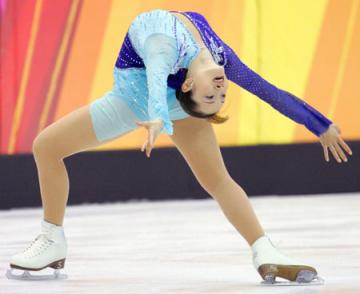テーマ: 英語のお勉強日記(8217)
カテゴリ: ニュースから
イギリスのメディアは好意的ですが、New York Times はひどいこと書いています。(そのように、私には感じられる。)
BBC Newsから
Arakawa wins figure skating gold
Trailing Cohen by only a point after the short programme, the Japanese skater scored a personal best 125.32 points with her free routine, a sparkling display set to Puccini's Turandot.
Arakawa's total of 191.34 left her a huge 7.98 points clear of her more illustrious rivals and earned the Japanese team their first medal of the Turin Games.
Telegraph News(UK)から
Arakawa wins Japan's first gold
Last night, the 24-year-old, who finished 13th in the Nagano Olympics in 1998, completed a flawless routine with confidence. She had reduced the difficulty level of three jumps, but it did not interfere with the presentation.
The audience went wild with cheering at one move, an Ina Bauer, in which travelling at speed along the ice with her feet pointed in opposite directions, she performed a back bend.

New York Times から
A Night of Nerves Is Settled on a Turn of Elegance
it was not the transcendent gold medal performance the Olympics often produces. So, ultimately, this competition will be remembered as much for who did not grab the gold medal as for who did.
特に傑出した演技ではなかったので、金メダルを取った選手も取れなかった選手も同じように記憶に残る大会だった…
"There was no unbelievable performance," said Hughes, who was here watching her sister Emily. "No one skated the performance of their life. It was a more subdued final. But every Olympics can't have that one amazing night."
「信じられないようなすばらしい演技はなかった。誰も自己最高のすべりをしなかった。静かな幕切れだが、オリンピックが必ずしも興奮と賞賛に包まれた夜を迎えるとは限らない。」
Arakawa did skate cleanly but downgraded two planned triple-triple jump combinations to triple-doubles. She also doubled another solo triple later in her program. But she did not fall ,
which nearly all of her pursuers did , and she won over the judges with seemingly effortless spins and spirals that were clearly ahead of the field.
And she did not seem nervous, which may have been her biggest accomplishment. (略)
Arakawa also did not have to battle perhaps her toughest competitor , Mao Asada, who is Japan's top skater but, at 15, was a few months too young to compete in the Olympics.
Cohen, however, has battled the pressure of the big moment her whole career, and her nerves have had a terrible habit of failing her.
Cohenとちがい、荒川にはプレッシャーがなかったからだ…とまでかいてあります。
私はうっとりして、何度も何度も繰り返し見ています。
Exhibitionも良かったですよね。
リラックスしてのびのびと、そしてしっとりと美しく、素敵でした。
演技中の笑顔がまた良いです。
BBC Newsから
Arakawa wins figure skating gold
Trailing Cohen by only a point after the short programme, the Japanese skater scored a personal best 125.32 points with her free routine, a sparkling display set to Puccini's Turandot.
Arakawa's total of 191.34 left her a huge 7.98 points clear of her more illustrious rivals and earned the Japanese team their first medal of the Turin Games.
Telegraph News(UK)から
Arakawa wins Japan's first gold
Last night, the 24-year-old, who finished 13th in the Nagano Olympics in 1998, completed a flawless routine with confidence. She had reduced the difficulty level of three jumps, but it did not interfere with the presentation.
The audience went wild with cheering at one move, an Ina Bauer, in which travelling at speed along the ice with her feet pointed in opposite directions, she performed a back bend.

New York Times から
A Night of Nerves Is Settled on a Turn of Elegance
it was not the transcendent gold medal performance the Olympics often produces. So, ultimately, this competition will be remembered as much for who did not grab the gold medal as for who did.
特に傑出した演技ではなかったので、金メダルを取った選手も取れなかった選手も同じように記憶に残る大会だった…
"There was no unbelievable performance," said Hughes, who was here watching her sister Emily. "No one skated the performance of their life. It was a more subdued final. But every Olympics can't have that one amazing night."
「信じられないようなすばらしい演技はなかった。誰も自己最高のすべりをしなかった。静かな幕切れだが、オリンピックが必ずしも興奮と賞賛に包まれた夜を迎えるとは限らない。」
Arakawa did skate cleanly but downgraded two planned triple-triple jump combinations to triple-doubles. She also doubled another solo triple later in her program. But she did not fall ,
which nearly all of her pursuers did , and she won over the judges with seemingly effortless spins and spirals that were clearly ahead of the field.
And she did not seem nervous, which may have been her biggest accomplishment. (略)
Arakawa also did not have to battle perhaps her toughest competitor , Mao Asada, who is Japan's top skater but, at 15, was a few months too young to compete in the Olympics.
Cohen, however, has battled the pressure of the big moment her whole career, and her nerves have had a terrible habit of failing her.
Cohenとちがい、荒川にはプレッシャーがなかったからだ…とまでかいてあります。
私はうっとりして、何度も何度も繰り返し見ています。
Exhibitionも良かったですよね。
リラックスしてのびのびと、そしてしっとりと美しく、素敵でした。
演技中の笑顔がまた良いです。
お気に入りの記事を「いいね!」で応援しよう
[ニュースから] カテゴリの最新記事
-
Sexual Abuse 2006.05.08
【毎日開催】
15記事にいいね!で1ポイント
10秒滞在
いいね!
--
/
--
Keyword Search
▼キーワード検索
hanaのつれずれなる…
hanatowakaさん
WONDERLAND Eosさん
夢の続きは潮風の向… riri_cafeさん
PC cafe _keiko_さん
ヘフレレ 王道名なしさん
NY帰り、はみだし社… John(中ちゃん)さん
Wordbook of Kurumim… くるみ もちさん
WONDERLAND Eosさん
夢の続きは潮風の向… riri_cafeさん
PC cafe _keiko_さん
ヘフレレ 王道名なしさん
NY帰り、はみだし社… John(中ちゃん)さん
Wordbook of Kurumim… くるみ もちさん
Comments
© Rakuten Group, Inc.












